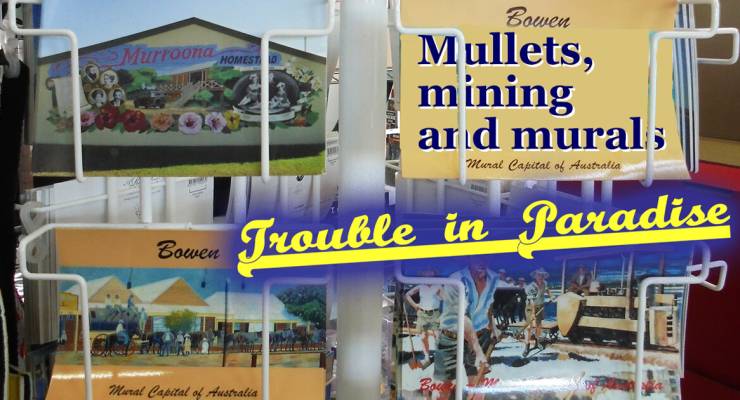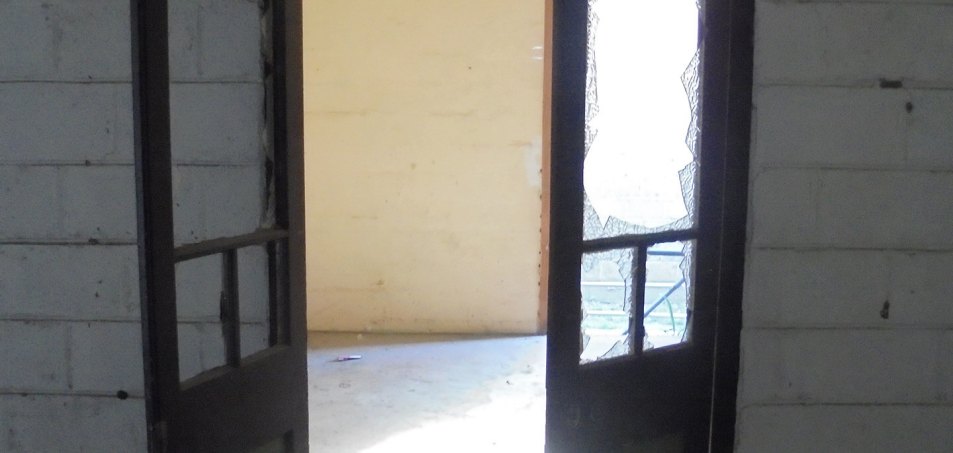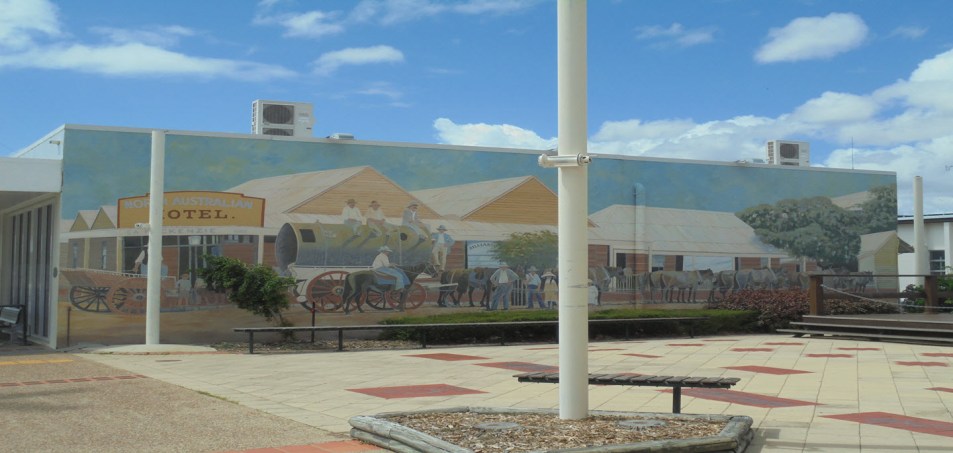
“The story of Queensland is that of the triumph of the white race over the tropical North …”
Raphael Cilento, in an official centenary history of Queensland, the only single volume state history in the Bowen Public Library
“Y’see, Pauline, I don’t hate Aborigines and I don’t hate Muslims. I just think we need to know who’s who …”
Pauline Hanson, resplendent in a shimmering coral dress, mimicking the Reef — in 20 years, a white dress will do — leans in to listen to the bloke in the hat talking at her. We’re in the beer garden of the Larrikin, Bowen’s second pub, a place, during the day, where dirty work clothes are less banned than compulsory. Tonight everyone’s in their best, which is all the way from suit and tie, to ironed singlet. The Battler Bus — a minibus with the Hanson face plastered on it — sits outside. Hanson is spruiking an economic message, but a lot of the people here want the old hits and memories.
“We need their names, we need a list.”
At this, Hanson’s stony visage gives nothing away. Her eyes flick around, she turns the conversation back to a coal-fired power station. Bowen is at the southern end of the seat of Burdekin, a possible pickup for One Nation. But One Nation strongholds are further north, and it’s a thin night at the Larrikin.
“I thought there’d be more, to be honest,” says the barmaid. Fifty or so people, about 20 round a big table, mostly as couples, a few older men with Asian wives (“these One Nation guys, they all have Asian wives,” Labor candidate Mike Brunker will say, days later. “It doesn’t make sense!” “Yeah Mike, it sorta does.”)
Big hat is at the bar. “Y’see, if I’ve got a dog and it’s one-third Alsatian, is it an Alsatian?” It’s not subtle, but Bowen doesn’t do subtlety when it comes to its history. The walls of the town are covered in murals, more than 20 of them, scenes from local history, the local band marching, the school opening, the US Air Force Catalinas landing in World War II, proud and illuminating, and very, very white.
More recently, the place featured in Australia, the ghastly film-tourism confection telling the story of the stolen generations through — or was it a nightmare? — the medium of the Wizard of Oz. What was once true of primary produce is now the case with culture: Bowen produces far more than the market can locally consume.

Sails, the downtown coffee shop, had been buzzing that morning, full, as it is every morning for about 50 minutes, starting from 10.30am. The place is an annex of one of the shut-down pubs on the main street — the main bar has never been cleared out, staring through the glass, you can still see band posters stuck to the ceiling, mulleted pub rockers — Radiators, Scientists, Chisel — ’80s big hair faded to blue. In the days when the mines and meatworks and the stations were all going full-tilt, this pub would have rocked hard, crowded to the walls, windows white-condensed.
Sails itself has the ad-hoc look of an upmarket bus stop cafeteria, big wooden tables of Japanese tourists spreading out maps, and wondering if they’ve made a terrible mistake, local council staff holding meetings, lawyers from the Magistrates’ Court, meeting their bewildered clients.
Today, everyone, everyone in town is talking about a Conversation article, “Why Big Projects Won’t Save Queensland“, by John Cole, published in The Brisbane Times — next to the “Shark kills bikie with sawnoff” pieces — and the Fairfax papers up the coast. The headline says it all really: the good times ain’t rolling back in, not with Adani, or anyone.
“What do you think?” I say to one old feller, with a skin like a map of WWI battlefields. He’s reading the paper, old skool, where you start at the top of the front page, and end, three hours later, at the weddings and bowls scores from Cloncurry, bony brown finger running down the columns of text.
“Ahhhhhhh experts say all sorts of things …”
The capacity for denial — the whole town was saying something of that sort — is going to be well tested in the week to come. Two days later, it will be reported that Adani’s profits have halved, its debt-burden risen; a day later, that the Carmichael mine, even if put into operation, would do nothing much more than drain demand away from the half-dozen smaller mines recently green-lit for the Bowen basin. By then, Frontline Action on Coal is locking on to fences along the rail route; and a TV forum of undecided voters in Brisbane will find none out of a hundred in favour of a billion-dollar loan for the rail line. The whole election has been one big “punk Bowen” ordeal.
Lionel meets me, on 10 minutes notice, bearing his lever arch files. Inside, court list upon court list, diagrams, regional economic plans. He has promised connections, introductions. None are forthcoming. But he has a 50-year plan for regional development — “we need ten Urannah dams!”. He has done major projects around the world, he is suing the AFP, he is investigating the deaths of two backpackers working at fruit-picking.
“People just disappear here,” he says. “Two guys from a good family killed [redacted], and they were spirited out of town. You know how they treat the pickers. No water breaks. They tell the girls to wear pads, and piss where they stand, working the hoppers.” His enemies had drugged him, he said. Legal warfare was underway. He nods to half the people who come and go. I pay for the coffee.
Newspaper man has turned three more pages in the next 25 minutes.
“Experts say all sorts of things,” he says, to no one in particular.

At the Larrikin, the Pauline party went on, as the pub closes, the barmaids hanging the beer mats on the back fence outside, thin strips of gold, green, blue, like service ribbons, foaming white, as they turn a hose on them, hopsy tang in the night air. James Ashby has his phone glued to his head, talking to Putin’s No.2 or something. Inside, I wander back and forth, take notes on conversations Der Stuermer wouldn’t publish. James, you had one job. Incredible.
“Quite a night,” says one man, enormous, in a floral shirt, the size of a wedding marquee. Huge, but fit, three Frank Moorhouses jammed together.
“So what’re the issues?”
“Jobs jobs jobs …”
“What do you do?”
“Cane farmer?”
“OK, so all this demand for this and that mega-scheme, for jobs … I mean, where did all these jobs go? There wasn’t an Adani 30 years back.”
He thinks for a second
“Consolidation, I guess. There used to be a lot of smaller farms, one on each corner, lot of workers. There were two meatworks in the region. The roads were full of workers. The big stations had so many men.” His eyes widen, looking into the past.
“The stations used to have the lawns round their houses manicured. Imagine that! Manicured! But I remember it, clear as day.”
“Those jobs aren’t coming back are they-“
“Wellllllllllllll, FIFO in the mines. The backpackers do the farms …”
“What about these backpacker murders?”
“What?”
“I hear people just disappear.” I mention the names I’ve been given.
His stare widens.

Slide the door open on one of the town’s three Asian restaurants. Everything else is closed by 8pm (Domino’s aside; the little cars with their lit-up roofs scoot back and forth all-night, munchie ambulances to outlying coneheads), they’re still going at 9.30.
“Yes sir, and what can I do for you?” The kid’s 18, going on 1893, in a Hong Kong-style shirt, and with an accent somewhere between BBC received pronunciation and Andrew O’Keefe announcing “great prizes!”.
“The cheesy spring rolls, and the beef with pineapple thanks. Can I ask — where are you from.”
“Well, I’ve grown up in Australia, we came from Vietnam-“
“Sorry, sorry, I didn’t mean that. I mean-“
“Oh the accent? Well I learnt English quickly from watching a lot of television. I practised.” It’s hilarious. Clipped tones in long-vowel country.
“So you’re working the family business.”
“Managing it. In the holidays.”
“In uni?”
“I’m actually finishing Year 12.”
“What are you going on to?”
“Well, dentistry or engineering.” The smile never falters. It’s as if these two options are like choosing between skiing in Gstaad, or summer on the Penthouse yacht.
The other joint, the next night. The waiter’s a tall golden-haired golden-skinned Anglo, “Bowen Senior High School ’17 Year 12 Wizard of Oz” commemorative top on: a pair of red shoes on black, the odd diamante.
“What were you?”
“The lion,” he drawls.
“I can see that — so uni now?”
He gives me a long look.
“Job?” I ask.
“I thought I might take it easy for a while …”
Raphael Cilento, call your office.
***
The night wind is in the trees as I walk back to the motel, absurd pseudo-Asian food swinging in plastic bags. The path is strewn with fallen mangos swept to the roadside. They’re bunched in the trees, scrotum-tight, then they fall all of a sudden apparently.
Pauline’s head whizzes by; it’s the Battler Bus, a small mobile mural, ferrying the travelling journos back to whatever breeze-block motel they’ve been put in. Ashby had been telling them war stories in the pub long after Pauline left. They look tired.
The distantly spaced streetlamps underline the murals proper, paintings of long-dead crowds watching long-passed parades. On the water tank above town, the legend “Bowenwood”, painted when the Australia crew was in town. Were it not for myths, this place would never have been settled. Now, they must be produced as mega-projects, for the place to keep going at all.








Crikey is committed to hosting lively discussions. Help us keep the conversation useful, interesting and welcoming. We aim to publish comments quickly in the interest of promoting robust conversation, but we’re a small team and we deploy filters to protect against legal risk. Occasionally your comment may be held up while we review, but we’re working as fast as we can to keep the conversation rolling.
The Crikey comment section is members-only content. Please subscribe to leave a comment.
The Crikey comment section is members-only content. Please login to leave a comment.